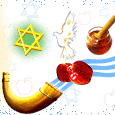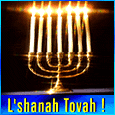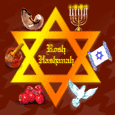
L'Shana Tova Tikatevu"May you be written down for a good year" (Rosh Hashanah greeting)
As I sat, on Saturday, September 23, the Jewish New Year of 5767 . within this very humble synagogue (Ahavas Sholom), the last operating synagogue in Newark, New Jersey, I sat wondering how I might meaningfully blog on the experience I was having that day. As the Cantor, (the professional singer who leads prayer services) orHazzan, as it is called in Hebrew was singing the prayers, I explored the Prayer Book ( the one used just for the holidays of Rosh Hashanah and Yom Kippur) searching for something that would elicit a feeling of special meaning for the day. I was seeking inspiration. It was not an easy task.


Granted, the task was ever the more difficult because not only am I not a truly religious person, but I am an agnostic, which makes the exploration itself, well, maybe a little hyrpocritical. After all, the book in which I am looking is one of Prayer and the prayers are all directed to God. If I don't believe in God, or even just question her existence, then how do I expect to find inspiration or something meaningful? I don't know how to answer this question, except to say that I do (expect to find meaning and inspiration). There is something to be said about the significance of prayer beyond it's relation to God. For example, the fact that most prayers are said, at least in the Jewish tradition, in unison with the community that is present is significant. I can remember when I was a young teenager, being at USY (United Synagogue Youth) conventions, with hundreds of other kids and singing some simple Hebrew song, like Henay Ma Tov U'manayim, Shevet Achim B'yachad (translation...Oh, how good and how nice it is to be sitting together with my brothers and sisters) in rounds. The spirit in that room and that pervaded that little 14 or 15 year old Jewish girl, was tangible and tremendous. Also, the fact that the words of the prayers and more significantly, the tunes in which they are sung, are consistent, also adds a sense of familiarity and spirit (though truth be told, they always change the tunes of the more familiar prayers for the High Holidays and though I know this, it disappoints me every time).

So, I searched and came up with three entries that I think help to consolidate the meaning of the High Holidays, at least for me. TheMehila is not really a prayer, but rather a supplication that in the Jewish tradition is required of every Jew before Yom Kippur. The idea is that before you can ask God for forgiveness on the Day of Atonement, you must first have asked your fellow human beings. I will begin with it and I will also mention that should it apply to any of my friends here in cyber-space, all the better.
Mehila: Asking for forgiveness
To be said to one's relatives, friends and acquaintances:
I am sorry if I have hurt you by what I have done or have failed to do, by what I have said or have not said to you since last Yom Kippur.
I will strive to
 improve my ways, and I ask for your understanding and forgiveness.
improve my ways, and I ask for your understanding and forgiveness.To look Forward
Eternal God!
Grant us on this Rosh Hashanah
Gratitude enough to look backward and be thankful;
Courage enough to look forward and be hopeful'
Faith enough to look upward and be humble;
Kindness enough to look outward and be helpful.
Author unknown

"Little" resolutions
A little less impatient with those we deem too slow;
A little less arrogant because of all we know;
A little less conceited since our worth is slight;
A little less intolerant even when we are right.
A little more forgiving and swifter to be kind;
A little more desirous the word of praise to find;
A little more eager to help others to rejoice;
A little more careful to speak with gentle voice.
A little more effort to see another's view;
A little more determined to live faithfully as a Jew;
A little more willingness to extend a helping hand;
A little more commitment to our people's and our land.
A little more eagerness to listen and understand;
A little more readiness to respond to God's command;
A little more resolve to do what must be done;
And a greater understanding that, truly, "we are one!"


9 comments:
Preparing for the fast. should be interesting.
Hey Ricardo,
I was just about to read your Y.K. blog (mainly because for some reason as I was opening mine, yours popped up....ooooh, scarrrrry ...maybe some mysitical High Holiday meaning there, who knows??) , but it was long and I've had a long day, so I'll get back to it. All I know about my fast is that I ate WAY TOO MUCH upon breaking it and I feel a bit sick to my stomach now.
g'night.
Look forward to what you have to say. Yes I'm still eating way too much.
I don't think there's anything hypocritical about an agnostic praying. An atheist maybe, but not an agnostic. I don't know if I got mail today or not, but I still check my mail box.
And I think there's something deep and primal and bonding about singing and reciting things together. I think that's why they make school kids say the Pledge of Allegiance. I think it's why almost all religions involve some sort of song or recitation in their services. It takes a group of individuals and transforms them from a bunch of "I"'s to a "we".
I love that on Yom Kippur, you have to ask forgiveness of other people before you can ask it of God. I think Christianity could (and should) learn something from that. I also love that atoning is followed by a new beginning. I'm a big believer in new beginnings.
One of my close friends wrote me on Yom Kippur that she didn't feel like she was doing the atoning part right. I told ther that I thought wondering if you were doing it right was a sure sign that you were actually doing it right. (Nothing like Yom Kippur advise from a Christian, huh?) But it seems to me there's something wrong at face at believing totally that you did it right. Atoning is a big job. Maybe an impossible one. But there's tremendous value in the effort, and part of that value I think is seeing how unequal we are to the task.
I loved the "little resolutions". I have a friend in A.A. who says, "If you steal, steal less. If you lie, lie less." We can all only change so much so fast.
I especially love that while you remain an agnostic, you have never stopped being a Jew. The God I believe in has room for all sorts of doubts. And, well, you know how I feel about Judaism. I love it. I cellebrate it. I envy it.
May you have every blessing and every peace in the coming new year.
And thanks for being my friend. It means a lot to me.
Hey Sherril,
Have you read or seen Everything is Illuminated? I've been studying the book for a class, and was wondering what you thought of it.
Also, I was wondering if you were familiar with any of Philip Roth's work and what you thought of him.
I hope you're doing well. I'm back on blogger now with readable font. ;)
What a rich entry, Sherril, and commentary, Dianne S.-- thanks for this window into which I must peek more often.
Sherril- I also don't think that its hypocritical to be reading the prayerbook if you are in an agnostic phase in your life. I don't even think its wrong if you were an atheist- only if you were reading the prayers for the purpose of mockery would it not be ok. Anyway- I'm glad you got something out of being at shul. Who knows, as a result, something else might happen. Be well.
I realize that I don't comment all that much here, since many times the topic is not within my realm of knowledge.
(It's not a very big realm to tell the truth.)
However, I DO come by here almost every single day to see if you've posted anything new.
Needless to say my level of disappointment is running high.
I do hope everything is ok on your end.
I'd love to hear about any movies you've seen lately.
Have you seen Stictly Ballroom?
I think you'd really like it.
It's one of my favorites.
Also, would you mind explaining your agnostism some time in the near future?
I find that people's definitions vary, like most beliefs.
Your devoted public is clamouring for another blog post.
P.S. Why haven't you weighed in on the latest post at "Outside of the box"?
Post a Comment